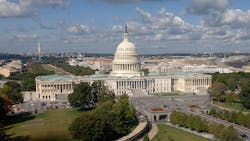President signs funding package into law, avoids second shutdown
President Donald Trump signed the "Consolidated Appropriations Act, 2019" on Friday, Feb. 15, which provides Fiscal Year 2019 funding for several government departments, including the U.S. Department of Transportation, through Sept. 30, 2019.
Paul Skoutelas, president and CEO of the American Public Transportation Association (APTA), called the president's signing of the legislation "great news."
“The Consolidated Appropriations Act, 2019...is great news for American commuters and communities as it continues historic funding levels with more than $16 billion for public transportation and intercity passenger rail.
“This legislation includes $13.4 billion for public transportation and $2.6 billion for intercity passenger rail grants and is $1.2 billion more than the FY 2019 FAST Act authorization levels. In addition to these significant funding levels, the bill specifically mandates that the U.S. Department of Transportation [USDOT] provide these funds in an expeditious manner.
“The Capital Investment Grant program is funded at $2.6 billion and requires the Federal Transit Administration to obligate 85 percent of these funds by December 31, 2020," said Skoutelas.
Funding highlights include:
- $900 million for Better Utilizing Investments to Leverage Development (BUILD) grants; which is less than the $1.5 billion that was appropriated in FY18 and language included in the bill says that no more than half of the funds can go toward rural or urban projects.
- $255 million for the Consolidated Rail Infrastructure and Safety Improvements (CRISI) Program; with no special allocation for Positive Train Control (PTC) grants as was done in FY18, but funds are to be prioritized to those railroads that are at risk of missing the PTC deadline of Dec. 31, 2020.
- $1.94 billion has been appropriated for Amtrak. Within this total, $650 million will be used for Northeast Corridor (NEC) grants and $1.291 billion will be for the national network. The NEC appropriations also calls for no less than $50 million be used to bring Amtrak facilities and stations in compliance with ADA requirements.
- $150 million for Washington Metropolitan Area Transportation Authority (WMATA); this is the final installation of funds to be appropriated to WMATA that was authorized under the Passenger Rail Investment and Improvement Act of 2008.
“These funds are critical to improving and expanding public transportation services around the country. [USDOT] estimates that there is a $90 billion backlog to bring our bus and rail systems to a state of good repair and the American Society of Civil Engineers has graded the condition of public transportation infrastructure a D- . In addition, this funding is essential to enable communities to provide new services to meet the growing transportation needs of their residents,” said Skoutelas.
About the Author

Mischa Wanek-Libman
Group Editorial Director
Mischa Wanek-Libman is director of communications with Transdev North America. She has more than 20 years of experience working in the transportation industry covering construction projects, engineering challenges, transit and rail operations and best practices.
Wanek-Libman has held top editorial positions at freight rail and public transportation business-to-business publications including as editor-in-chief and editorial director of Mass Transit from 2018-2024. She has been recognized for editorial excellence through her individual work, as well as for collaborative content.
She is an active member of the American Public Transportation Association's Marketing and Communications Committee and served 14 years as a Board Observer on the National Railroad Construction and Maintenance Association (NRC) Board of Directors.
She is a graduate of Drake University in Des Moines, Iowa, where she earned a Bachelor of Arts degree in Journalism and Mass Communication.
